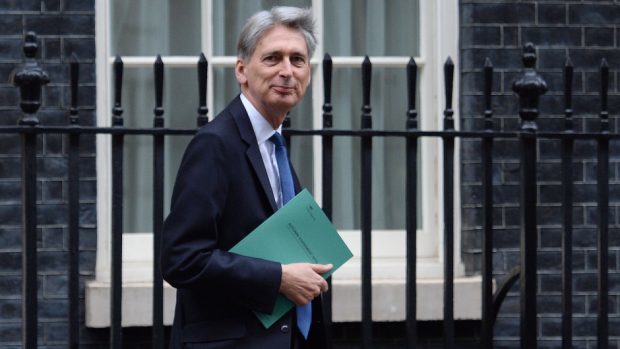The impact of Brexit was laid bare yesterday as forecasts predicted the UK economy would take a £60billion hit over the next five years as a result of the referendum outcome.
As well as a spike in borrowing, Chancellor Philip Hammond revealed the Office for Budget Responsibility (OBR) had downgraded growth estimates for next year amid uncertainty following the June vote.
Delivering his first Autumn Statement, the Tory frontbencher put on a brave face, insisting the economy had so far “confounded commentators at home and abroad” since then.
He claimed Brexit had thrown into “sharp relief” the economy’s “fundamental strengths”.
But he also acknowledged it had made tackling long-term weaknesses more urgent.
And as expected, he abandoned his predecessor George Osborne’s plan to achieve a budget surplus by the end of the decade.
In spite of the gloomy figures, Mr Hammond announced a £23billion fund for investment in infrastructure and innovation, aimed at increasing the UK’s productivity.
The Treasury said this focus would mean a £800million boost to the Scottish Government’s coffers over the next four years.
It can choose how it spends the increase in capital budget.
Mr Hammond additionally confirmed the UK Government’s commitment to the Tay Cities and Edinburgh city deals and revealed it will now open negotiations with Stirling.
As widely predicted there was support for the so-called Jams – families who are ‘just about managing’.
This included cancelling the fuel duty rise for the seventh successive year and confirmation of the increase in the tax free personal allowance.
It is due to rise to £12,500 and the higher rate threshold to £50,000 by the end of this parliament.
On top of that, Mr Hammond announced an increase in the National Living Wage from £7.20 to £7.50 in April, which he said was a pay rise worth more than £500 a year to a full-time worker.
But critics branded the planned reduction to the Universal Credit taper rate – the rate at which support is withdrawn from low income working households – as insufficient.
And concerns were also raised about the impact of another rise in insurance premium tax, pushing up the cost of home, car, pet and buildings insurance.
Instead of a budget surplus, the chancellor said the public finances would be returned to balance “as early as possible” in the next parliament, while leaving “enough flexibility” to support the economy in the shorter-term.
There were two other rules in his new draft charter for budget responsibility – that public sector net debt as a share of GDP must be falling by the end of the parliament and that welfare spending must be within a cap.
In another change, Mr Hammond announced the Autumn Statement is to be abolished with the Budget moved from March to the autumn.
According to the independent OBR, the Government could be expected to borrow £122billion more over the five years to 2020/21 than it predicted at the time of the Budget in March – three months before the Brexit vote.
It said that some £58.7billion of this was directly attributable to the referendum result and the cost of leaving the EU.
Pat McFadden, who is active in the Open Europe campaign, said this exposed the reality of Britain’s post-Brexit economy – borrowing up, growth down, investment lower and prices higher.
He added: “The government must now do everything it can to safeguard jobs and investment, which means rejecting a hard and destructive Brexit.”
The OBR forecast is for growth to be 2.1% in 2016, higher than forecast in March.
But in 2017 it is predicted to slow to 1.4% – a decline driven by greater uncertainty and higher inflation due to sterling depreciation – recovering to 1.7% in 2018 and 2.1% in 2019/20.
It is the OBR’s view that the referendum outcome means that potential growth over the forecast period is 2.4 percentage points lower than would have otherwise been the case.
On debt, it predicts a rise from 84.2% of GDP last year to 87.3% this year, peaking at 90.2% in 2017/18 before falling in 2018/19.
Mr Hammond said he had heeded the warnings in these figures when putting his plans together.
He added: “Our task now is to prepare our economy to be resilient as we exit the EU.”
